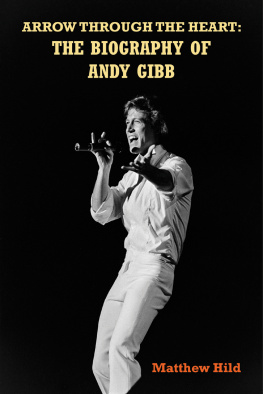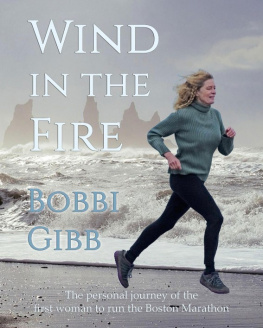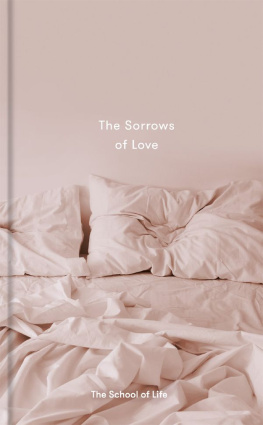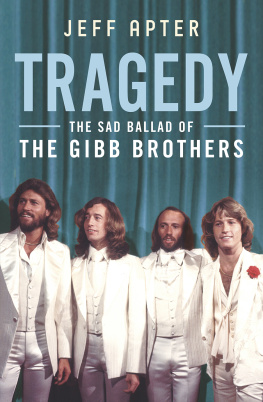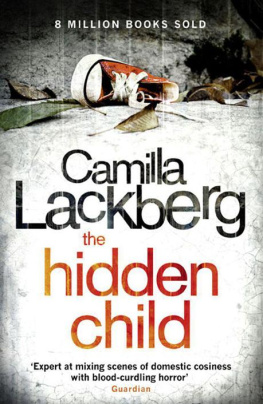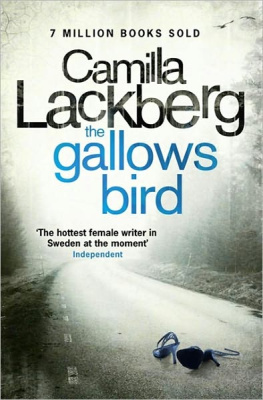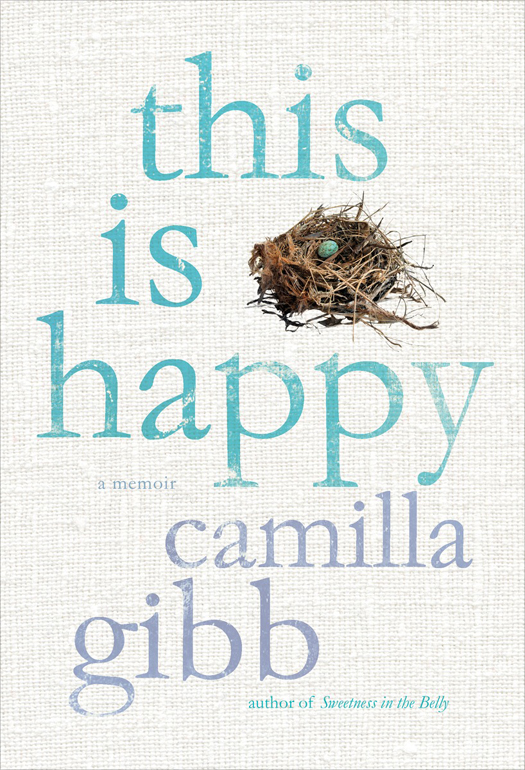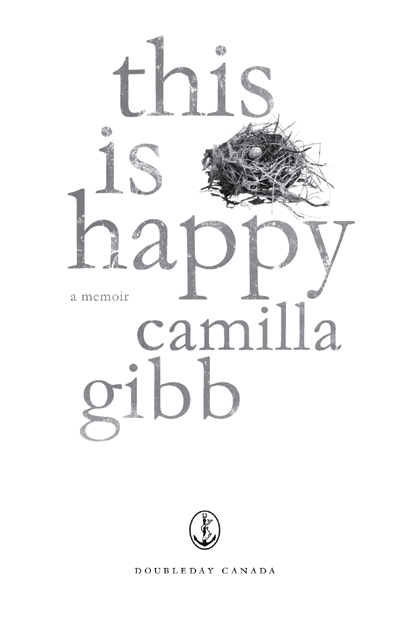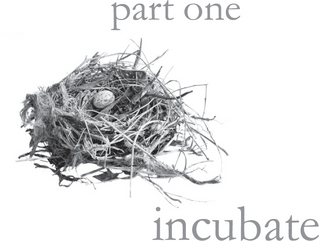ALSO BY
camilla gibb
Mouthing the Words
The Petty Details of So-and-sos Life
Sweetness in the Belly
The Beauty of Humanity Movement
Copyright 2015 Camilla Gibb
All rights reserved. The use of any part of this publication, reproduced, transmitted in any form or by any means electronic, mechanical, photocopying, recording or otherwise, or stored in a retrieval system without the prior written consent of the publisheror in the case of photocopying or other reprographic copying, license from the Canadian Copyright Licensing agencyis an infringement of the copyright law.
Doubleday Canada and colophon are registered trademarks of Random House of Canada Limited.
LIBRARY AND ARCHIVES CANADA CATALOGUING IN PUBLICATION
Gibb, Camilla, 1968-, author
This is happy / Camilla Gibb.
ISBN 978-0-385-67812-4 (bound). ISBN 978-0-385-67813-1 (epub)
1. Gibb, Camilla, 1968-. 2. Authors, Canadian (English)20th centuryBiography. I. Title.
PS 8563. I 2437 Z 53 2014 C 813.54 C 2013-906256-4
C 2013-906257-2
Cover design: Kelly Hill
Cover and text image (egg in nest): Jill Battaglia/Shutterstock.com
Cover background textures: Flas100 and Nik Merkulov, Shutterstock.com
Published in Canada by Doubleday Canada,
a division of Random House of Canada Limited,
a Penguin Random House company.
www.penguinrandomhouse.ca
v3.1
Contents
To be rooted is perhaps the most important and least recognized need of the human soul.
Simone Weil
prologue
It is a crisp fall Saturday and I am alone with my daughter, without plans, daunted about getting through the day. My parents have two new catsI welcome the spontaneous invitation to come over and meet them. My daughter has become a cat herself; it takes two hours to wrangle her into a diaper and a dress, and then the fight over sitting in her car seat begins.
She is two years old. No, I dont want to, I dont have to, I wontshe has various ways of expressing a consistent opinion.
It is 11:15 a.m. and we have been up for six hours. We have had a bath and cooked breakfast and made tea and read books and done art and sung songs and played soccer and I am ready for adult company and the distraction of cats and grandparents. But my daughter wants to drive the car. She wants to play with the lock and tune the radio. She wants to do anything but get into her car seat.
Im promising cats! Grandparents! Riverdale Farm! Goldfish! Dora Band-Aids!
My daughter sits in the drivers seat punching the buttons on the CD player. She helpfully pronounces it broken.
I give up. I sit down on the pavement and tell her Ill wait until shes ready to get into her car seat. I wait a very long time.
Okay, I finally say, standing up, impatient. Would you like to have my Saturday? Go for a walk, maybe buy some flowers, a paper and some bread and sit and read for a bit in a caf over a coffee?
Yes, she says, much to my astonishment.
So now we are sitting outdoors as I have an Americano and she has a glass of warm milk and a slice of baguette and some fancy French cheese. The basket of my daughters tricycle holds the pink and yellow flowers she chose from a bucket at the corner store down the street. She eyes me reading my newspaper. Would you like the magazine? I ask.
Yes, she says.
I give her the magazine. She flicks through it, slowing at cleavage and jewels, while I read the paper. Birds hover at her feet, hoping for a crumb. I tell her we can feed the birds, ask her if she wants to. Little pieces, I tell her, they have tiny mouths. She studies them as they snatch the pieces from the ground.
I drink my coffee, scan the newspaper and watch my little girl. You are my daughter, I realize. You are the daughter of someone relatively quiet and tending toward the serious. Im sorry for not understanding that these things are part of who you are, too. I am sorry for having been so afraid. For having failed to relax enough to know this about you; for having failed to share with you who I am.
We come to know ourselves only through stories. We listen to the stories of others, we inherit the stories of those who came before, and we make sense of our own experiences by constructing a narrative that holds them, and holds us, together. Stories are how we make sense of our lives.
All sorrows can be borne if you put them into a story or tell a story about them, Isak Dinesen once said. Sorrows are all pain otherwise, pain without sense or meaning. But joys, too, it seems to me, need their context. And sometimes their coexistence needs to be borne. The coexistence or possibility of the opposite can be what gives an experience its meaning. At its simplest, that is a story.
And this is mine. It can only be mine, the way I have found to make sense of things. It risks the involvement of others because we do not become ourselves in isolation. Telling such a story, furthermore, relies on memory, that most fallible of sources. It demands the creation of something coherent out of disparate bits and pieces and gaps in knowledge. It is flawed in the way every memoir is inherently flawed. Still, we continue to relate such stories. Because they are necessary. We are the storytelling animal; our stories are what make us human.
1
I never expected to be happy, to have a sense of belonging somewhere. I didnt grow up with a sense that this was possible or even desirable. Im quite sure my parents didnt either, so I come by this honestly. Still, they did try to find a way out of what was unhappy. Forty-something years ago, they hatched a plan to escape their English lives. They felt stifled in England, trapped by the expectations of family, of class. They drew up an alphabetical list of Commonwealth countries, ruling out Australia because of distance (and a slight penal twinge), and chose Canada as the place to immigrate with my brother and me, two children under four.
We were too young to understand what was happening. My father came over a year in advance to find a job and a place for us to live. I cried when this strange man lifted me up at the airport. Three months after our arrival, a package arrived from my paternal grandmother. She was a great maker of fudge and had sent us a box of it. I remember the sense of anticipation as my mother peeled back the lid and the collective disappointment as the contents were revealed: green and furry, having spent six weeks on a ship. I understood, somehow, that something between here and there had been broken.
We had no history here, no story of belonging. This disorientation didnt suit my fathera rule-bound, rigid, public-school-educated former British Army officer who had been thrown out of the military for his insult of a black superior. Despite his desire to emigrate to a freer world, his beliefs about race, class, women and children just became more entrenched in Canada. And more obviously peculiar.


